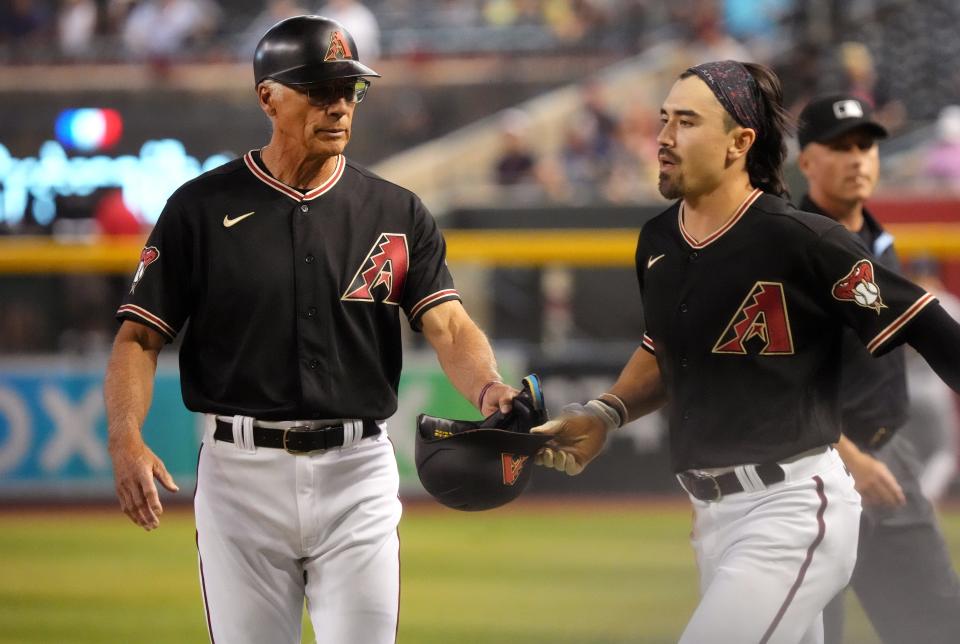Meet Dave McKay, the man behind the Diamondbacks’ baserunning success
Corbin Carroll broke for second and stole the base easily, not even drawing a throw. The steal helped the Arizona Diamondbacks win a game during the first week of the season, and when Carroll was asked later about his decision to run, he smiled and shrugged.
“Mac said, ‘Get ‘em,’” Carroll said.
That would be Dave McKay, the Diamondbacks’ first-base coach extraordinaire. When McKay tells a Diamondbacks baserunner that the opportunity is there to steal, more often than not a successful attempt soon follows.
Baseball’s new rules have created a stolen-base environment unseen in the sport for more than a decade. The Diamondbacks are well-positioned to take advantage of it. They have a young, athletic and speedy roster. And, perhaps just as important, they also employ McKay.
So far, that combination has been dangerous. Through 13 games, the Diamondbacks have stolen 17 bases, tied for the second-most in the majors. They have been caught just once. It has felt, at times, like they have run at will on the opposition.
And it often seems like McKay is at the center of it all, despite the fact that he does his best to deflect attention.
“No, don’t give me credit,” McKay said this week. “I really don’t need any credit. I give it all to the players. And (manager) Torey (Lovullo). We owe him a lot of this stuff. Torey points out a lot of stuff to me.”

McKay, 73, is in his 40th season as a major league coach and his 35th consecutive as a first-base coach, during which time he has built a reputation as one of baseball’s best instructors when it comes to outfield defense and baserunning. His effectiveness is borne of a relentless work ethic, an eye for detail and a willingness to hold players accountable.
The night before every game, McKay studies the opposing team’s pitchers for tells in their deliveries. He searches for small, subtle movements that might betray whether they are about to come home with a pitch or throw to first on a pickoff attempt.
“I think he falls asleep looking at it,” Carroll said.
The next day, McKay makes his rounds through the clubhouse with an iPad, showing players examples of what he finds. If a pitcher’s head moves a certain way, McKay might say, you know you can go. But if his leg does this, he might add, he is about to pick over.
“It always seems like he has something for us,” outfielder Jake McCarthy said.
Added first baseman Christian Walker: “You can tell when we go to play a team, they’re very aware that Dave McKay is on our side. And we have something, most likely, on the pitcher.”
Unlike those coaches who choose their spots to impart wisdom on players, McKay sees every play as a learning opportunity. McCarthy said that after his triple on Sunday, McKay delivered a message.
“He was like, ‘Great turn around second, but bad turn around first,’” McCarthy said. “There’s always room to improve. I just think it’s good for all of our sakes when it’s like, ‘Hey, good job. But here’s what we need to improve.’
“I think he’s earned that right. We all have so much respect for him with how long he played and how long he has just been in Major League Baseball, so when he talks, we all listen, regardless of how tedious it might be. It’s very helpful to us.”
Entering Thursday, there had been 314 stolen base attempts in 185 games played in the majors this season. That works out to 1.7 attempts per game. Baseball has not seen a number that high since 2012, when there were 1.8 attempts per game.
Read more: Diamondbacks, Lovullo make statements in winning series vs. Brewers

When it comes to the new rules, McKay was not initially sure what to make of them. He likes to walk over to a runner on first and talk through a situation, giving him a pitcher’s time to the plate and reminding him of what to look for in a delivery. In that sense, the pitch clock is limiting.
He also had qualms about pitchers being limited in terms of how often they can disengage with the rubber and throw to first.
“First base coaches will tell you that you get a lot of information on people throwing over,” he said. “My thinking was, if they’re not throwing over, you don’t have that information. They could surprise you with a pretty good move. The more they throw over, anybody will tell you, the less chance of them picking off somebody.”
The tradeoff, of course, is fewer throws, plus a pitch clock that limits pitchers’ ability to vary their times to the plate. Those factors help lengthen leads while also giving a baserunner the thing he needs most to steal: courage.
“That’s a very big part of being successful,” Lovullo said. “I think when they come over there one time, it might enhance your opportunity to get to the next base and be more confident about it.”
That said, McKay is not sure how many of the Diamondbacks' stolen bases might be the result of the changes, though only one of their 17 steals was preceded by a pickoff attempt. More than likely, McKay said, the Diamondbacks would still be running almost as aggressively.
Though the Diamondbacks are two back of the Cleveland Guardians for the most steals in baseball, McKay makes clear that is not a category he cares about leading.
“We’re just kind of going about our business the way we always have,” he said. “We’re real aggressive. We’re smart aggressive. We’re not trying to jump anybody or take chances. We’re not trying to lead the league in stolen bases. That’s not even a thought. We’re just trying to take advantage of situations where we can run.”
And when McKay says one of those situations has arrived, his players do more than listen.
“I mean, 100 percent,” Carroll said. “There’s just some times that he just knows. He lets you know if that is the situation, and then it’s 100 percent trust.”
'Who I am at my core': Lovullo's relentless positivity withstands every Diamondbacks test
This article originally appeared on Arizona Republic: Meet the man behind the Arizona Diamondbacks’ baserunning success

